- Home
- Parnell Hall
7 Shot
7 Shot Read online
Praise for Parnell Hall’s mystery SHOT
“An endearing hero ... unorthodox mysteries ... forever-fresh series. Stanley ... plays a game of basketball that is pure poetry.”
—Marilyn Stasio, New York Times Book Review
“Another fine mess ... another laugh-filled plot.”
—Phil Thomas, Associated Press
“You’ll become addicted to Stanley Hastings.”
—Mystery News
“Before the twisting plot leads to two climaxes (one farcical) we get vivid looks at Manhattan’s seamier side, pointers on one-on-one basketball, and a sweet victory for a 10-year-old Harlem boy.”
—Publishers Weekly
SHOT
Parnell Hall
Copyright © 1991, 2010 by Parnell Hall
Published by Parnell Hall, eBook edition, 2010.
Published by Onyx Books: NAL Penguin Inc., 1993.
ISBN:978-0-451-40354-4
Originally published by Donald I. Fine, Inc., 1992.
ISBN: 978-1-55611-239-3
All rights reserved. No part of this book may be reproduced in whole or in part without written permission from the author, except by reviewers who may quote brief excerpts in connection with a review in a newspaper, magazine, or electronic publication; nor may any part of this book be reproduced or transmitted in any form or by any means, electronic or mechanical, without permission in writing from the author.
ISBN (Kindle): 978-1-936441-16-7
ISBN (ePub): 978-1-936441-17-4
Cover design: Michael Fusco Design | michaelfuscodesign.com
For Jim and Franny
Table of Contents
Chapter 1
Chapter 2
Chapter 3
Chapter 4
Chapter 5
Chapter 6
Chapter 7
Chapter 8
Chapter 9
Chapter 10
Chapter 11
Chapter 12
Chapter 13
Chapter 14
Chapter 15
Chapter 16
Chapter 17
Chapter 18
Chapter 19
Chapter 20
Chapter 21
Chapter 22
Chapter 23
Chapter 24
Chapter 25
Chapter 26
Chapter 27
Chapter 28
Chapter 29
Chapter 30
Chapter 31
Chapter 32
Chapter 33
Chapter 34
Chapter 35
Chapter 36
Chapter 37
Chapter 38
Chapter 39
Chapter 40
Chapter 41
Chapter 42
Chapter 43
Chapter 44
Chapter 45
Chapter 46
Chapter 47
Chapter 48
Chapter 49
Chapter 50
Chapter 51
Chapter 52
Books by Parnell Hall
1.
I GOT A CLIENT.
I do that now—take on clients, I mean. I don’t even try to talk ’em out of it anymore. I don’t tell ’em I’m not a real detective, or at least what people think of as a real detective, which is the kind you see on TV. I don’t point out that I’m basically nonaggressive, never had a fist fight in my life, and don’t even carry a gun.
Nor do I point out that the majority of my work as a private eye consists of chasing ambulances for the law firm of Rosenberg and Stone, which involves mainly interviewing accident victims and photographing cracks in the sidewalk. While this is real private eye work, it’s not the kind you see on TV and I doubt if anyone would be particularly impressed. So I don’t bother to mention it.
And I don’t sweat my obligation to Rosenberg and Stone anymore, either. When a client comes along with a case I wanna handle, I just call Richard Rosenberg and tell him I won’t be available for a while. I’ve finally learned that while Richard may squawk a bit—make that one hell of a lot—he’s not about to fire me. After all, I’m his senior investigator. And by a wide margin. Aside from me, he’s never had one last as long as six months. I’ve been there for more years than I want to think of, especially since the detective work was supposed to be a temporary job to tide me over during the lean years in my writing career. It tided me over all right. Now I’m on the wrong side of forty, going on senile, with no immediate career prospects in sight.
At any rate, over the years Richard and I have more or less come to an understanding. I understand he’s never gonna give me a raise over the ten bucks an hour and thirty cents a mile the cheap son of a bitch pays me, and he understands I got a wife and kid to feed and when other work comes along I’m gonna take it. Not that he won’t piss and moan and give me a hard time about it. It’s just that when he does I let it roll off my back. Just like he lets it roll off his back every time I bring up the unobtainable raise.
At any rate, Stanley Hastings Detective Agency is taking on clients now. Which means I am, since my agency’s a one man show. And like I said, I don’t do anything to discourage ’em anymore. I just listen to the story, take down the information, nod my head and say, “Two hundred bucks a day plus expenses.”
I been thinkin’ about saying two-fifty.
2.
HER NAME WAS MELISSA FORD. No relation to the past president. At least, I assume no relation—actually I didn’t ask her. But if she were, I imagine she’d have brought it up.
But maybe not. Melissa Ford was a shy and timid person, perhaps even more than me. Which made me fairly comfortable during the interview. Made me feel like I was actually in charge.
She met me at my office on West 47th Street, the one room, hole in the wall affair that used to house my father-in-law’s plastic bag company, and which he still carried on the company books but allowed me to use for my detective work—which was the only reason I had an office at all, otherwise the rent would have been prohibitive. She was standing there when I showed up at nine o’clock to pick up the mail. Any other time she would have missed me. I don’t hang out in the office much. I’m out most of the day, chasing down accident cases.
Melissa Ford was one of the mousiest women I’d ever met. She was small and frail, but that wasn’t just it—I’ve known many women her size who were tigers. Not her. She had short-clipped hair, curled under, forming a lopsided, brown halo around her head. She wore narrow-lensed glasses with pointy corners, slightly down on her nose, and she kept her chin down and her head tucked in, and peered up over her glasses, birdlike, when she looked at me, which wasn’t often.
As to how she was dressed, well, I’m about as good at describing women’s clothes as I am at discussing German opera, which is to say, not at all. At any rate, she was wearing a print dress of some sort, which might have been gingham or calico or something like that, if I had any idea what those things meant. Whatever it was, it was faded and unbecoming, and did nothing to enhance a figure that, to the best I could determine, was flat as a board. Despite that, she was wearing a white bra, the shoulder straps of which occasionally showed through the neck hole of the gingham or calico or whatever print dress she was wearing, which seemed to cause her no end of embarrassment, ’cause she was constantly fiddling with the shoulders of the dress and adjusting it over the straps.
We were seated in my office. I had determined that she was indeed waiting for me, opened the door, uncluttered a chair for her, seated her down and begun the interview, which, I realized early on, I was going to have to carry myself.
“Now, Miss Ford,” I said, once I’d gotten the matter of identity squared away. “What can I do for you?”
The question seemed to terrify her. She
dropped her gaze to the ground, then glanced around the office, looking anywhere but at me. “It’s my boyfriend,” she said.
Her voice was so soft I had to lean in to catch it. Even then, I wasn’t sure I’d heard her right. Somehow I couldn’t imagine Melissa Ford with a boyfriend.
“Boyfriend?” I said.
“Yes,” she said, again not meeting my eyes, giving the impression that having a boyfriend was some great sin of which she ought to be ashamed.
I waited for more but it didn’t come. Instead, she reached up and tugged the left shoulder of her dress over her bra strap, then hunched her shoulders together and hugged herself, as if as a gesture of modesty after the damning admission of having a boyfriend.
“What about him?” I said. “Is he in trouble?”
That startled her. She put up her hands, and even raised her eyes. “No, no,” she said. “Nothing like that. David wouldn’t do anything like that.”
“David?”
“Yes.”
She looked down at the floor again.
Good lord. This was like pulling teeth. I summarized, trying to prompt her. “All right,” I said. “You came to see me about your boyfriend, David. What is it that you want?”
Her thin lips had been set in a straight line. Now they curved down at the corners, like a cartoon drawing of an unhappy person.
“I feel so guilty,” she said.
“Guilty?”
“Yes. For being here.”
The situation became clear. Her boyfriend, David, was stepping out on her, and she wanted to hire me to verify the fact.
I must say, my sympathies were all with David. Why he would be stepping out on this woman was not one of the great mysteries of the modern world. Why he’d ever hooked up with her to begin with, was.
“Let me get this straight,” I said. “You think David’s seeing another woman?”
Her eyes widened and her jaw dropped open. “Why do you say that?”
“Well, I—”
“You don’t even know David. Do you?”
“No. Of course not.”
“Then why would you say that?”
“Well—”
“That’s a horrible thing to say.”
“I’m sorry,” I said. “I shouldn’t have jumped to that conclusion. But when a woman consults me about her boyfriend, that’s usually the case.”
That was pretty ballsy of me to say, since I couldn’t recall a time a woman had ever consulted me about her boyfriend.
But Melissa Ford didn’t know that. She took my statement at face value. She also took it as a personal rebuke. She looked down, fidgeted, and then hurried to cover her right bra strap, which had become visible in the heat of the moment.
“I’m sorry,” she said. “I’m nervous. I’ve never done this before.”
I wasn’t sure if she meant consult a private detective, or have a boyfriend.
“No problem,” I told her. “Take your time, and then tell me what you want.”
She did. She took a few moments to compose herself, then raised her eyes and spoke. She didn’t raise ’em as far as eye level, and she seemed to address a corner of my desk, but at least she got on with it.
“My boyfriend, David. David Melrose. I’ve been seeing him for two months now. I like him very much. That’s why I feel so bad about being here. But I need to know.”
“Know what?” I prompted.
“If he’s serious.”
Once again the situation became clear, only this time I was right about it. It was something I’d read about somewhere, probably, I must confess, in the New York Post. Whether it was fear of AIDS, whether it was natural prudence, or whether it was just another yuppie trend like VCRs, CDs and Fax machines, more and more women were hiring private detectives to check out their sexual partners before making a commitment.
I can’t say I thoroughly approved of the practice. On the other hand, I can’t say I thoroughly approve of a good deal of the ambulance chasing I do either. At any rate, the bottom line was I needed the work.
And in Melissa Ford’s case, there actually seemed to be a point to it. I hate saying that, but there you are. You see, it turned out she happened to have some money. Not multi-million, hold-the-phone, bug-your-eyes-out-of-your-head money, but a comfortable enough nest egg to assure her she would never have to worry about working again. Naturally, she needed to know if her ardent young suitor was interested in her or the cash.
Which is what I hate to say, particularly the “naturally.” But that’s the way I saw it. In mousy, plain Melissa Ford’s case, it didn’t seem a bad bet that Davey-baby was after the loot.
Now I know that’s a horribly sexist thing to say—the woman’s unattractive, how could anyone like her for herself? Couldn’t this guy just like her for her mind?
Yes, he could. And maybe she likes him for his. And maybe they get on great together. Maybe they converse freely. And maybe when they do, she even looks in his eyes instead of at the doorknob. And maybe this was a match made in heaven, and the best thing I could possibly do for Melissa Ford and David Melrose would be butt out and let ’em get on with it.
Yeah, maybe.
And maybe someday I’ll actually write the great American novel and it will get published and I’ll be able to quit the private detective business altogether and get by on just my writing.
But I wouldn’t bet on it.
3.
YOU MUSTN’T JUDGE ME too harshly.
No, not about the sexist stuff—go ahead and blast me for that, I got it coming. No, I mean for my greed.
See, I took the Melissa Ford case. With a five hundred dollar advance—two hundred bucks a day for a two day minimum, plus a hundred for expenses. All straightforward and aboveboard. No problem with that.
The greedy part, the not entirely kosher part, the part where you mustn’t judge me too harshly is, having taken Melissa Ford’s money for two days’ work, I didn’t feel it had to be exclusive. I mean, checking out this guy’s background wasn’t gonna be a rough job. There was no reason to get all excited about it, go rushing around like a lunatic and turn down other work.
What I’m trying to tell you is, even though I’d worked it out with Richard Rosenberg that if something came up I could call him and tell him I wouldn’t be available for a while, just because I was able to do that, didn’t mean I had to. And the thing was, I already had an assignment from Rosenberg and Stone to go see a potential client in the Bronx at eleven o’clock that morning. And I saw no reason to give it back.
Now, I know that’s excessive greed. I already had two hundred bucks from Melissa Ford, so did I really need another thirty from Rosenberg and Stone for a three hour signup the same day? Was it morally and ethically right for me to take it?
Well, probably not. But you gotta understand. Living in New York City isn’t cheap. And I got a wife and kid to feed. And my work for Rosenberg and Stone isn’t steady, I usually average about thirty hours a week. And a client like Melissa Ford doesn’t come along every day, or even every week. And I’m always behind on the rent, the telephone, my son Tommie’s tuition or Con Ed. So every little bit is needed and every little bit helps. So I wasn’t really giving Melissa Ford short shrift, and what I was doing wasn’t really that bad.
At least, that’s what I told myself as I drove up to the Bronx to interview Joe Oliver, who had fallen on a cracked sidewalk and broken his arm.
Joe Oliver lived in one of those neighborhoods in the South Bronx that you would never go to but always see on TV, usually under the heading DRUG BUST or COP SHOT or often a combination of the two, an undercover cop shot as the result of a drug bust gone bad. Oliver’s street looked like a war zone. Half the buildings torn down, leaving rubble-filled empty lots. Some of the buildings gutted but still standing. Nestled in among these, a few buildings still occupied. Not that the gutted buildings weren’t—junkies and winos hung out on the steps of several of them. It was the type of neighborhood that used to terrify me when I star
ted my job. Actually it still does. It’s just that I’ve gotten used to it, that this is my cross to bear, to go into places like this and be scared out of my mind. And I know rationally that I’m pretty safe doing it, that’s no one’s gonna mess with me. ’Cause scared as I am of the junkies hanging out, they’re even more scared of me. Because without meaning to be, I am a symbol of authority. I am a white man in a suit and tie. And in neighborhoods like that, a white man in a suit and tie is a cop. And in buildings like Joe Oliver’s, junkies part before me like the Red Sea. When that happens, I know I’ve been taken for The Man, and unless I accidently walk in on a drug deal, I’m relatively safe. This knowledge does not stop me from having a nervous breakdown every time it happens.
Aside from where he lived, the Joe Oliver case was a piece of cake. He’d fallen on the sidewalk outside his building and broken his arm, and now he wanted to sue the city of New York. I had him sign retainer forms, employing Rosenberg and Stone to act in his behalf in the suit, which cost him nothing unless he got a settlement, in which case Rosenberg would get a third, which the city of New York would pay. Which was fine with him, as it was with all of Rosenberg’s clients. Filing an accident claim was a no-risk gamble—if they won they made out, and if they lost they didn’t pay. It was no wonder the city’s courts were clogged with civil suits, I, of course, being a prime contributor to the problem.
I filled out a fact sheet on Joe Oliver, had him sign all the necessary forms, took a picture of the cast on his arm, and then went outside with him to shoot pictures of the broken sidewalk. He was happy to go out with me, saying he felt safe having me along. I didn’t express the opinion, but I felt the same about him. Whipping out my camera in front of a bunch of junkies is never my idea of a good time. I figure they might see it as half a gram. I also figure when they see I’m packin’ a camera instead of a gun, they might reevaluate that cop determination.
At any rate, Joe and I stuck together for moral support, no junkies hassled us, and I fired off a whole roll of shots of the sidewalk outside his building, which was in bad enough repair to have felled a whole army of Joe Olivers. I finished the assignment, shook hands with Joe, and made for my trusty Toyota, which was parked right out front, and which had never been stolen in neighborhoods like this thanks to the two hundred and fifty dollar code alarm I’d had installed in it. I opened the door, punched in the code for the alarm, started the motor.

 Clicker Training
Clicker Training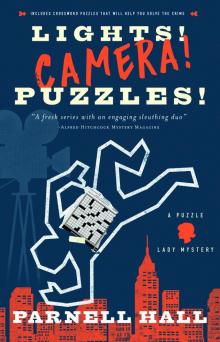 Lights! Camera! Puzzles!
Lights! Camera! Puzzles!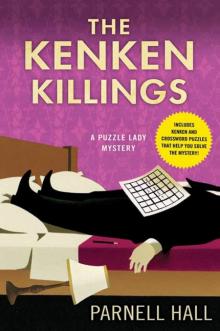 The KenKen Killings
The KenKen Killings 12-Scam
12-Scam The Puzzle Lady vs. the Sudoku Lady
The Puzzle Lady vs. the Sudoku Lady 2 Murder
2 Murder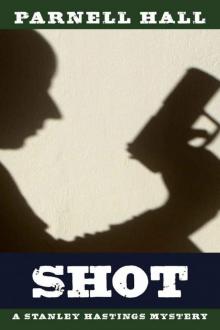 7 Shot
7 Shot You Have the Right to Remain Puzzled
You Have the Right to Remain Puzzled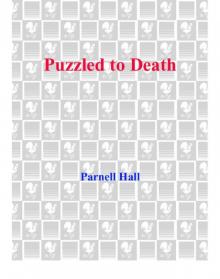 Puzzled to Death
Puzzled to Death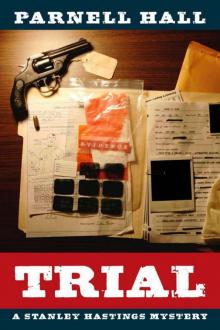 11-Trial
11-Trial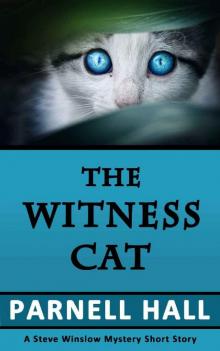 The Witness Cat (Steve Winslow Mystery)
The Witness Cat (Steve Winslow Mystery) With This Puzzle, I Thee Kill
With This Puzzle, I Thee Kill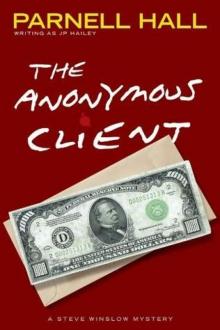 The Anonymous Client sw-2
The Anonymous Client sw-2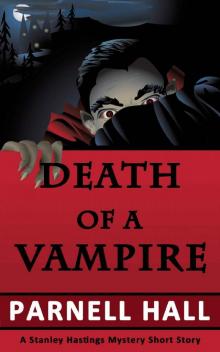 Death of a Vampire (Stanley Hastings Mystery, A Short Story)
Death of a Vampire (Stanley Hastings Mystery, A Short Story)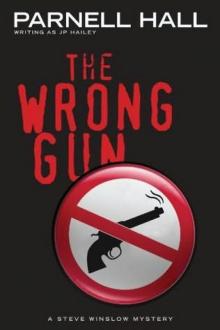 The Wrong Gun sw-5
The Wrong Gun sw-5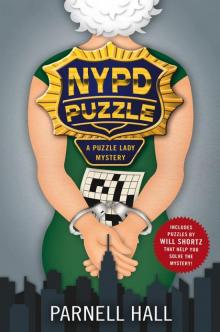 NYPD Puzzle
NYPD Puzzle 6 Juror
6 Juror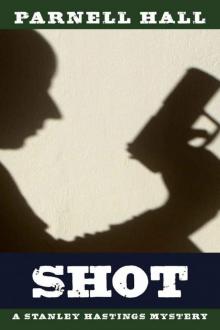 07-Shot
07-Shot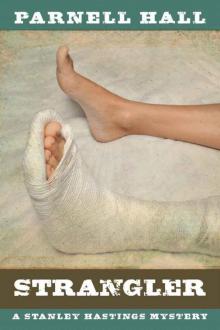 04-Strangler
04-Strangler 02-Murder
02-Murder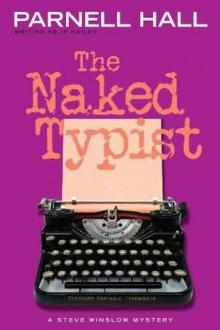 SW04 - The Naked Typist
SW04 - The Naked Typist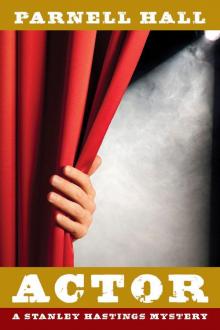 Actor
Actor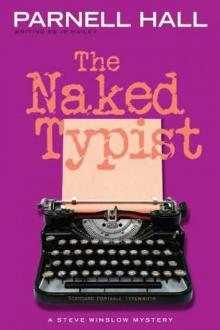 The Naked Typist sw-4
The Naked Typist sw-4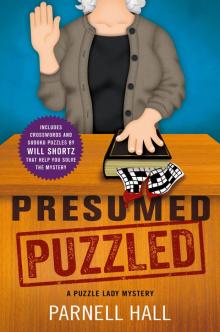 Presumed Puzzled
Presumed Puzzled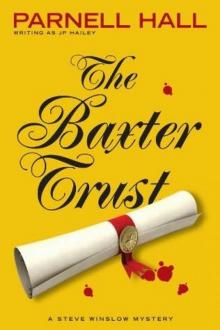 SW01 - The Baxter Trust
SW01 - The Baxter Trust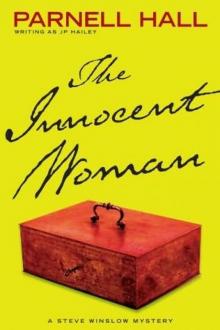 SW06 - The Innocent Woman
SW06 - The Innocent Woman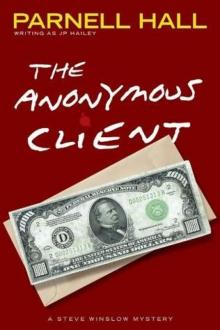 SW02 - The Anonymous Client
SW02 - The Anonymous Client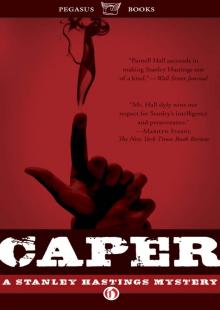 Caper
Caper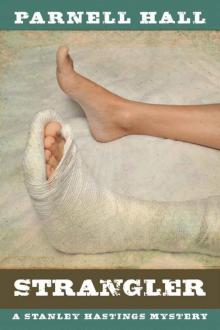 4 Strangler
4 Strangler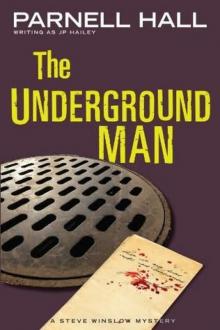 The Underground Man sw-3
The Underground Man sw-3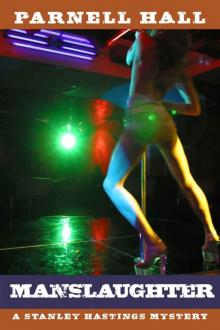 Manslaughter (Stanley Hastings Mystery, #15)
Manslaughter (Stanley Hastings Mystery, #15)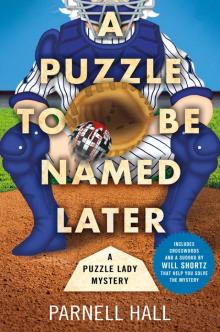 A Puzzle to Be Named Later--A Puzzle Lady Mystery
A Puzzle to Be Named Later--A Puzzle Lady Mystery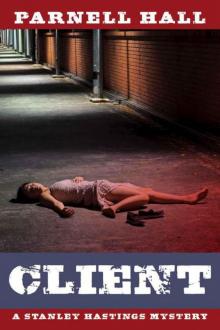 05-Client
05-Client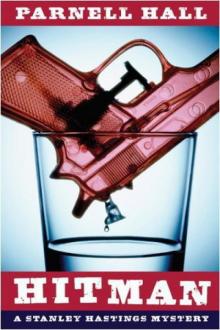 16 Hitman
16 Hitman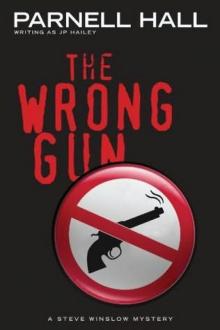 SW05 - The Wrong Gun
SW05 - The Wrong Gun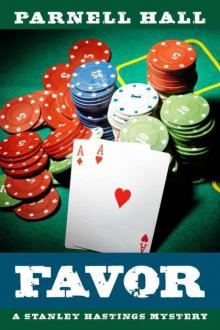 3 Favor
3 Favor Last Puzzle & Testament
Last Puzzle & Testament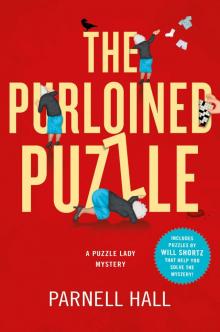 The Purloined Puzzle
The Purloined Puzzle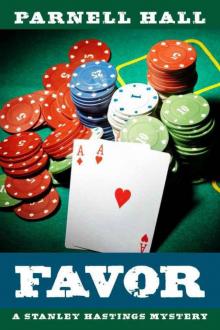 03-Favor
03-Favor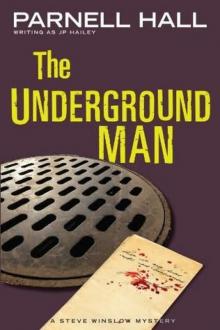 SW03 -The Underground Man
SW03 -The Underground Man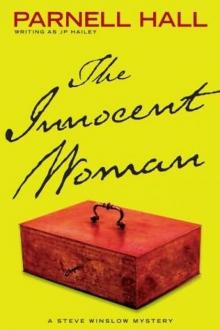 The Innocent Woman sw-6
The Innocent Woman sw-6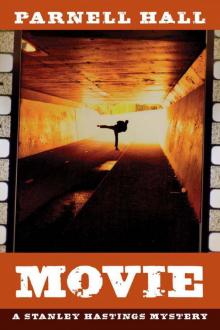 10 Movie
10 Movie 06-Juror
06-Juror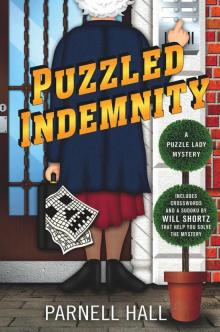 Puzzled Indemnity
Puzzled Indemnity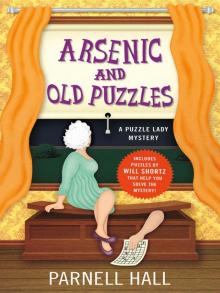 Arsenic and Old Puzzles
Arsenic and Old Puzzles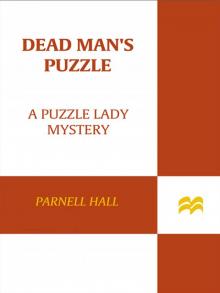 Dead Man's Puzzle
Dead Man's Puzzle Safari
Safari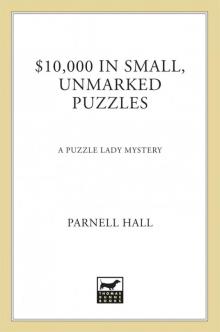 $10,000 in Small, Unmarked Puzzles
$10,000 in Small, Unmarked Puzzles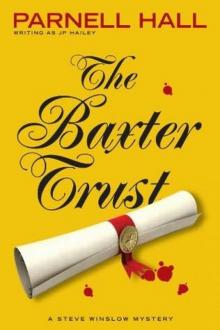 The Baxter Trust sw-1
The Baxter Trust sw-1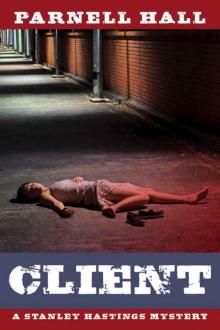 5 Client
5 Client Cozy (Stanley Hastings Mystery, #14)
Cozy (Stanley Hastings Mystery, #14)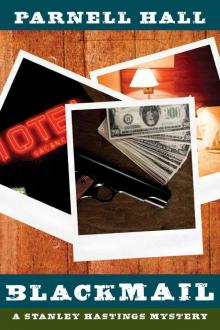 Blackmail
Blackmail A Puzzle in a Pear Tree
A Puzzle in a Pear Tree A Clue for the Puzzle Lady
A Clue for the Puzzle Lady Clicker Training (Stanley Hastings Mystery, A Short Story)
Clicker Training (Stanley Hastings Mystery, A Short Story)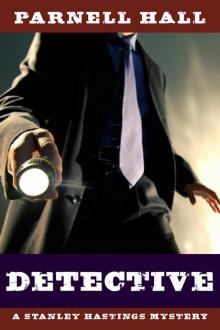 Detective (Stanley Hastings Mystery Book 1)
Detective (Stanley Hastings Mystery Book 1) 13 Suspense
13 Suspense